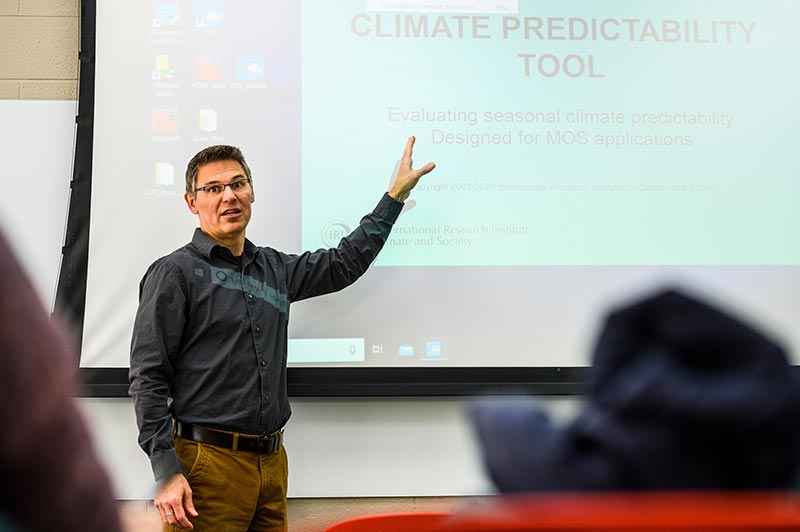The Center for Climatic Research has a 60-year tradition of conducting interdisciplinary research on the climate system. CCR was founded in 1962 by Professor Reid A. Bryson, whose career-long interests included global-scale climate processes and links between human societies and the atmosphere. Following Professor Bryson, subsequent CCR directors included Professors John Kutzbach, Zhengyu Liu, Jack Williams, and Dan Vimont. Michael Notaro is the current director.

CCR is part of the Nelson Institute for Environmental Studies and includes more than 50 faculty members, scientists, staff, and graduate students. The Center for Climatic Research brings together leading climate scientists with researchers in geography, botany, oceanography, and other disciplines to investigate our past, present, and future climate and their implications for 21st century climate change.
CCR connects with units across UW-Madison as well as U.S. and international universities and research institutes. Our faculty, scientists, and students are based in departments such as Atmospheric and Oceanic Sciences, Botany, Geography, and Geosciences.
Our funding sources include National Science Foundation, Department of Energy, National Oceanic and Atmospheric Administration, National Aeronautics and Space Administration, Wisconsin Focus on Energy, Environmental Protection Agency, National Institute for Health, United States Department of Agriculture, Wisconsin Sea Grant, and private donors.
Thanks to an anonymous gift to the university in honor of Professor Reid Bryson, the Bryson Interdisciplinary Climate, People, and Environment Program (CPEP) was established within CCR in 1991.
We continue to build on our traditional excellence in the earth system science, while rapidly growing our capacity to assess the impact of 21st century climate change on natural and social systems. Our partnership with the Wisconsin Initiative on Climate Change Impacts (WICCI) offers a model example of how university researchers can engage with decision-makers in the public and private sectors.
Since it was founded, CCR faculty and staff have published over 1,000 scientific articles and CCR supported students have produced 54 master’s theses and 60 PhD dissertations.
2024 CCR Year in Review
Learn about the breadth of CCR’s explorations from 2024 in our newsletter, which offers snapshots into activities from the past year, including recaps from our biggest events, a look at our center’s outreach initiatives, and an overview of exciting research initiatives.
Read now: Climate Connections, the 2024 CCR Year in Review (pdf)
Mission
We advance understanding of the climate system through interdisciplinary investigation of past, present, and future climates, and use this knowledge for socially relevant purposes.
CCR accomplishes this mission by:
- Excelling in disciplinary and interdisciplinary research using observations and earth-system models
- Integrating knowledge of past, present, and future climates to create a more holistic understanding of the climate system
- Researching the physical, ecological, and societal impacts of climate change
- Collaborating with university, state, national, and international researchers to study topical climate-related problems
- Promoting public understanding of climate-related issues, including global change
To deepen our understanding of the earth system, we have explored topics such as the following:
- Studying the causes of climate variability and abrupt climate change on time scales ranging from years to decades and centuries to millions of years
- Investigating how climate might change in the future due to natural causes and human actions
- Providing locally downscaled climate projections to decision-makers in the public and private sectors
- Studying past climates, investigating the effects of solar and volcanic variability, orbital changes, and plate tectonic processes on the earth system
- Evaluating the accuracy of modeled simulations of past climates to gain confidence in our ability to estimate future climates
- Contributing to improved treatment of clouds, oceans, sea-ice, ice sheets, vegetation, and carbon cycling in climate models
- Linking terrestrial and marine ecosystem models with global climate models to study the dynamics of the coupled systems and possible past, present, and future changes in vegetation,
- Studying the causes of climate variability and abrupt climate change on time scales ranging from years to decades and centuries to millions of years
- Investigating how climate might change in the future due to natural causes and human actions
- Providing locally downscaled climate projections to decision-makers in the public and private sectors
- Studying past climates, investigating the effects of solar and volcanic variability, orbital changes, and plate tectonic processes on the earth system
- Evaluating the accuracy of modeled simulations of past climates to gain confidence in our ability to estimate future climates
- Contributing to improved treatment of clouds, oceans, sea-ice, ice sheets, vegetation, and carbon cycling in climate models
- Linking terrestrial and marine ecosystem models with global climate models to study the dynamics of the coupled systems and possible past, present, and future changes in vegetation, bioproductivity, and biodiversity
Join the Friends of CCR Mailing List
When you sign up for the Friends of CCR mailing list, you’ll receive our annual newsletters and stay informed about major upcoming events.
To subscribe, send a blank email to ccr-friends+subscribe@g-groups.wisc.edu.